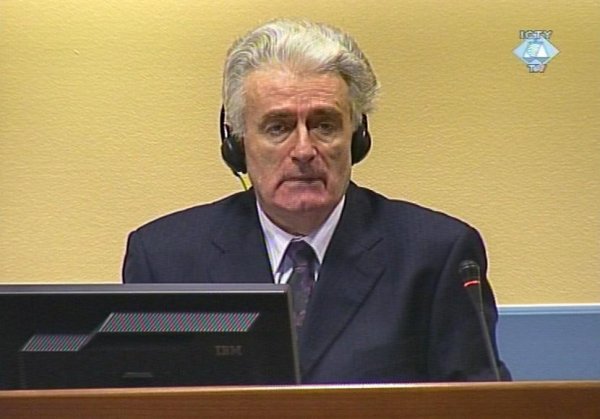Home
RADOVAN KARADZIC CHARGED WITH DOUBLE GENOCIDE
The new amended indictment against Radovan Karadzic charges him with two instances of the crime of genocide: the first one was committed in ten BH municipalities between 31 March 1992 and the end of 1992 and the other in Srebrenica in the summer 1995. The prosecution believes that the changes made in the indictment will allow a more efficient and faster presentation of its case
 Radovan Karadzic in the courtroom
Radovan Karadzic in the courtroom The amended indictment against Radovan Karadzic the prosecution submitted to the Trial Chamber yesterday has eleven counts as had the so-called operational indictment drafted in April 2000. The counts are not identical, though: two counts from the earlier indictment have been dropped, and replaced with two new counts. The indictment has also been brought in line with the current jurisprudence, it covers a smaller area and the legal and factual pleadings on the criminal responsibility of the former Bosnian Serb political leader are more precise now.
The key difference between the two indictments is the separation of the genocide charge into two separate counts relating to two different time periods in the BH war. The first genocide charge covers the period from 31 March to 31 December 1992 in the territory of ten BH municipalities: Bratunac, Brcko, Foca, Kljuc, Kotor Varos, Prijedor, Sanski Most, Visegrad, Vlasenica and Zvornik. As the prosecution alleged, the persecution campaign against Bosnian Muslims and Croats implemented throughout BH in that area escalated to the scale of genocide.
The other genocide count refers to the period from July to November 1995 and the killing of more than 7,000 Muslim men and boys and the grave bodily and mental harm inflicted on thousands of women, children and old men who were transferred forcibly from the Srebrenica enclave.
Karadzic is charged with those and other crimes in the indictment under both bases available under the ICTY Statute: individual and command responsibility. The new amended indictment has a new element: Karadzic’s responsibility as a key person in the joint criminal enterprise aimed at forcible and permanent removal of Bosnian Muslims and Croats from large parts of BH territory. Three other criminal enterprises are linked with the main criminal enterprise: one that aimed at terrorizing the citizens of Sarajevo, one that had the extermination of Muslims from the Srebrenica enclave as its goal and one whose objective was taking UN personnel hostage.
The new amended indictment names key persons in the joint criminal enterprise: Karadzic, Momcilo Krajisnik, Ratko Mladic, Slobodan Milosevic, Biljana Plavsic, Nikola Koljevic, Mico Stanisic, Momcilo Mandic, Jovica Stanisic, Franko Simatovic, Zeljko Raznatovic Arkan and Vojislav Seselj.
In comparison with the initial indictment, the so-called ‘crime base‘ was reduced from 41 to 27 BH municipalities. The prosecution intends to prove Karadzic’s responsibility for crimes committed in those municipalities: persecution on political, racial and religious grounds including detention, torture, rape and sexual violence as well as the destruction of religious and cultural monuments. Three counts in the indictment charge Karadzic with extermination and murder qualified as a crime against humanity and violation of laws and customs of war. The prosecution decided to drop the charges of willful killing as a grave breach of Geneva conventions; otherwise it would have to prove the international character of the BH conflict.
Counts seven and eight charge Karadzic with deportation, cruel treatment and forcible transfer. The charge of terror against the citizens of Sarajevo was added as a separate count in the new amended indictment; Karadzic is charged with unlawful attacks on civilians. The last, eleventh count in the new indictment refers to the hostage-taking of more than 200 UN personnel and using them as human shields in May and June 1995.
The prosecution believes that the changes in the indictment, if approved by the Trial Chamber, will enable more efficient and faster presentation of evidence maintaining at the same time the rights of the accused.
Linked Reports
- Case : Karadzic
- 2008-09-17 KARADZIC'S 'FIGHT FOR TIME'
- 2008-08-29 RADOVAN KARADZIC REFUSES TO ENTER PLEA
- 2008-08-21 A NEW TRIAL CHAMBER FOR RADOVAN KARADZIC
- 2008-10-06 KARADZIC WANTS TO INSPECT PROSECUTION ARCHIVES
- 2008-10-10 KARADZIC KNOCKING ON THE WRONG DOOR
- 2008-10-16 KARADZIC WANTS ‘COPY OF AGREEMENT’ WITH HOLBROOKE
